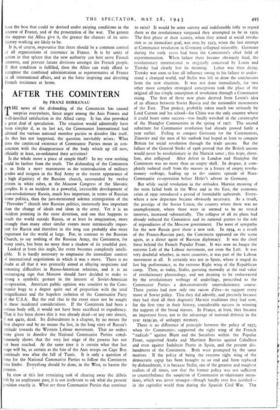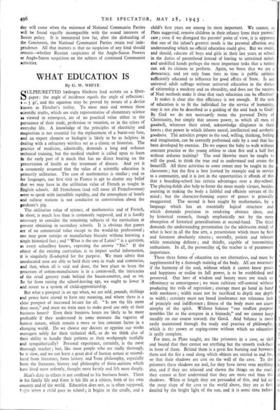AFTER THE COMINTERN
By FRANZ BORKENAU HE news of the disbanding of the Comintern has caused
T
surprise everywhere, fierce anger among the Axis Powers and well-justified satisfaction in the Allied camp. It has also provoked a great deal of speculation. The situation would admittedly have been simpler if, as its last act, the Communist International had advised the various national member parties to dissolve like itself. As this has not happened, the question inevitably arises: What does the continued existence of Communist Parties mean in con- junction with the disappearance of the body which up till now, officially at least, co-ordinated their activities?
Is the whole move a piece of simple bluff? In my view nothing could be farther from the truth. The disbanding of the Comintern is as little a mere manoeuvre as the reintroduction of military grades and insignia in the Red Army or the recent appearance of a high dignitary of the Russian church, surrounded by twelve priests in white robes, at the Moscow Congress of the Slavonic peoples. It is an incident in a powerful, irresistible development of post-revolutionary Russia, much less important, in terms of Russian home politics, than the just-mentioned solemn reintegration of the Pravoslav " church into Russian politics, immensely less important than the change of ideals. and ideas in the army. Yet it is an incident pointing in the same direction, and one that happens to touch the world outside Russia, or at least its imagination, more strongly than many other similar events more intrinsically impor- tant for Russia and therefore in the long run probably also more important for the world at large. For, in contrast to the Russian Church, to say nothing of the Russian Army, the Comintern, for many yeirs, has been no more than a shadow of its youthful past.
Looked at from this angle,'the event becomes completely intelli- gible. It is hardly necessary to emphasise the immediate context of international negotiations in which it was a move. There is no doubt at all that it was primarily aimed at allaying suspicions and removing difficulties in Russo-American relations, and it is an encouraging sign that Moscow should have decided to make so strong a symbolic gesture in the interest of Soviet-American co-operation; American public opinion was sensitive to the Com- munist bogy to a degree quite out of pioportion with the total insignificance and the hopeless isolation of the Communist Party of the U.S.A. But the real clue to the event must not be sought in these incidental considerations. If the Comintern had been a serious body still, it would not have been sacrificed to expediency. That it has been shows that it was already dead—at any rate almost, if not quite, dead. Its disbandment is a chapter, by no means the first chapter and by no means the last, in the long story of Russia's attitude towards the Westein Labour movement. That no orders were given to dissolve the National Communist Parties simul- taneously shows that the very last stage of the process has not yet been reached. At the same time it is certain what that last stage will be, as certain as the fate of the Axis troops on Cape Bon peninsula was after the fall of Tunis. It is only a question of time for the National Communist Parties to follow the Comintern into limbo.. Everything should be done, in the West, to hasten the process.
In view of this last remaining task of clearing away the debris left by an unpleasant past,_it is not irrelevant to ask what the present position exactly is. What are these Communist Parties that continue to exist? It would be utter naivety and indefensible folly to regard them as the revolutionary vanguard they attempted to be in The first phase of their nastory, when they aimed at social revolu- tion as an immediate goal, was over by 1923, when the last attempt at Communist revolution in Germany collapsed miserably. Germany during the early years had been the Comintern's chief field of experimentation. When failure there became obviously final, the revolutionary international as originally conceived by Lenin and Trotsky had clearly lost its meaning. Lenin was then dying, Trotsky was soon to lose all influence owing to his failure to under- stand a changed world, and Stalin was left to draw the conclusions from the new situation. It was not done immediately, for two other more complex strategical conceptions took the place of the original all too simple conception of revolution through a Communist rising. The first of these new plans derived from Lenin's idea of an alliance between Soviet Russia and the nationalist movements of the East. That project, probably taken much too seriously by Lord Curzon and his school—for China was the only country where it could boast some success—was finally wrecked in the catastrophe of the Shanghai Communists in the spring of 1927. The second substitute for Communist revolution had already proved futile a year earlier. Failing to conquer Germany for the Communists, Zinoviev and the men of his outlook had hoped at least to conquer Britain for social revolution through the trade unions. But the failure of the General Strike of 1926 proved that the British unions would never be revolutionary in the Marxist sense ; this hope, there- fore, also collapsed After defeat in London and Shanghai the Comintern was no more than an empty shell. In despair, it com- pletely isolated itself from the masses in a frenzy of empty revolu- tionary verbiage, leading up to th- sinister episode of Nazi- Communist co-operation before Hitler's advent in Germany.
But while social revolution in the orthodox Marxist meaning of the term failed both in the West and in the East, the economic crisis of 1930 introduced a period of formidable upheavals. Every- where a new departure became obviously necessary. As a result, the prestige of the Soviet Union, the country where there was no unemployment, where there were or seemed to be no vested interests, increased substantially. The collapse of all its plans had already reduced the Comintern and its national parties to the role of stipendiaries of the Moscow government. The wave of sympathy for the new Russia gave them a new task. In 1934, as a result of the Franco-Russian pact, the Comintern appeared on the scene again, as a direct agent. of Russian diplomacy. It was the chief force behind the French Popular Front. It was now no longer the extreme Left of the Labour movement, not even the Left. It was very doubtful whether, in most countries, it was part of the Labour movement at all. It certainly was not in Spain, where it staged its last big performance, as the extreme Right wing of the Republican camp. Then, as today, Stalin, guessing shrewdly at the real value' of revolutionary phraseology, and not desiring to be embarrassed by the revolutionary verbiage of underlings, prescribed to the Communist Parties a demonstratively unrevolutionary course. These parties had now only one raison d'être—to support every move of Soviet policy. This they did adroitly, and precisely because they had shed all their dogmatic Marxist traditions they had now, for the first time in their history, considerable success in winning the support of the broad masses. In France, at least, they became an important force, not to the advantage of national defence in the year 1939/40, of unhappy memory.
There is no difference of principle between the policy of 1937, when th,! Communists supported the right wing of the French "radicals" against Blum and the Socialists within the Popular Front, supported Azafia and Martinez Barrios against Caballero and even against Indalecio Prieto in Spain, and the present dis- bandment of the Comintern. Both were prompted by the same motives. If the policy of being the extreme right wing of the democratic camp has been brought to an end and been replaced by disbandment, it is because Stalin, one of the greatest and toughest realists of all times, saw that the former policy was not sufficient to counterbalance the suspicion of Communist re 'olutionary inten- tions, which was never stronger—though hardly ever less justified— in the capitalist world than during the Spanish Civil War. The
day will come when the existence of National Communist Parties will be found equally incompatible with the sound interests of Soviet policy. It is immaterial how far, after the disbanding of the Comintern, the National Communist Parties retain real inde- pendence. All that matters is that no suspicion of any kind should remain—whether Russian suspicions of the Anglo-Saxon Powers or Anglo-Saxon suspicions on the subject of continued Communist activities.



























 Previous page
Previous page